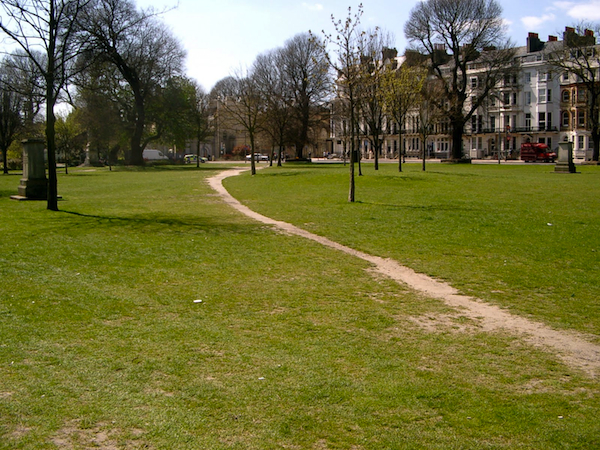مفردات ألفاظ القرآن. - للأصفهاني
كتاب الطاء
طرق
-
الطريق: السبيل الذي يطرق
بالأرجل، أي يضرب. قال تعالى: {طريقا في البحر}
<طه/77>،
وعنه استعير
كل مسلك يسلكه الإنسان في فعل، محمودا كان أو
مذموما. قال: {
ويذهبا
بطريقتكم المثلى} <طه/63>، وقيل: طريقة من
النخل، تشبيها بالطريق في الامتداد،
والطرق في الأصل: كالضرب، إلا أنه
أخص؛ لأنه ضرب توقع كطرق الحديد بالمطرقة، ويتوسع فيه توسعهم في الضرب،
وعنه
استعير:
طرق الحصى للتكهن، وطرق الدواب الماء بالأرجل حتى تكدره، حتى
سمي الماء الدنق طرقا (قال ابن فارس: والطرق: الماء الذي قد كدرته الإبل.
المجمل 2/595)، وطارقت النعل، وطرقتها، وتشبيها بطرق النعل في الهيئة،
قيل: طارق بين الدرعين، وطرق الخوافي (ريش الطائر، ويقابلها القوادم) : أن
يركب بعضها بعضا،
والطارق:
السالك للطريق، لكن خص في التعارف بالآتي ليلا،
فقيل: طرق أهله طروقا، وعبر عن النجم بالطارق لاختصاص ظهوره بالليل. قال
تعالى: {والسماء والطارق} <الطارق/1>، قال الشاعر:
299 - نحن بنات طارق
(الرجز لهند بنت بياضة، وهو في اللسان (طرق) ؛ والمجمل 2/595؛ والبصائر
3/504.
وقيل: لهند بنت عتبة)
وعن الحوادث التي تأتي ليلا بالطوارق، وطرق فلان: قصد ليلا. قال الشاعر:
300 - كأني أنا المطروق دونك بالذي * طرقت به دوني وعيني تهمل
(البيت لأمية بن أبي الصلت، من أبيات أولها:
غذوتك مولودا وعلتك يافعا * تعل بما أدني إليك وتنهل
وهو في الحماسة البصرية 2/306؛ وشرح الحماسة للتبريزي 2/133؛ وتفسير
القرطبي 10/246)
وباعتبار الضرب قيل: طرق الفحل الناقة، وأطرقتها، واستطرقت فلانا فحلا،
كقولك: ضربها الفحل، وأضربتها، واستضربته فحلا. ويقال للناقة: طروقة، وكني
بالطروقة عن المرأة. وأطرق فلان: أغضى، كأنه صار عينه طارقا للأرض، أي:
ضاربا له كالضرب بالمطرقة، وباعتبار الطريق، قيل: جاءت الإبل مطاريق، أي:
جاءت على طريق واحد، وتطرق إلى كذا نحو توسل، وطرقت له: جعلت له طريقا،
وجمع الطريق طرق، وجمع طريقة طرائق. قال تعالى: {كنا طرائق قددا}
<الجن/11>، إشارة إلى اختلافهم في درجاتهم، كقوله: {هم درجات عند
الله} <آل عمران /163>، وأطباق السماء يقال لها: طرائق. قال الله
تعالى: {ولقد خلقنا فوقكم سبع طرائق} <المؤمنون/17>، ورجل مطروق:
فيه لين واسترخاء، من قولهم: هو مطروق، أي: أصابته حادثة لينته، أو لأنه
مضروب، كقولك: مقروع، أو مدوخ، أو لقولهم: ناقة مطروقة تشبيها بها في
الذلة.
Lisan Al-Arab
Ibn Manzour Afriqi
Tariqa is mannerism a circumstance is kept within a person (
Hala). My
Tariqa means my habit, my common way of doing something:
72:16. (And
Allah's
Message
is): "If they (the Pagans) had (only) remained on the (right)
Tariqa (Monotheistic behaviour and belief) , We should certainly have
bestowed on them Rain in abundance.
